
Recently on Cyclingnews.com |
An interview with Alexandre Vinokourov, September 18, 2006
Winning the Vuelta
Vinokourov completes evolution
Alexandre Vinokourov has long been regarded as one of the most exciting riders in cycling, due to his all-out aggression. Landing victory in the Vuelta means he is now a fully-fledged Grand Tour champion, as Shane Stokes reports from Madrid.
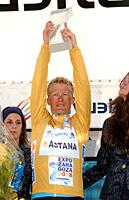
|
It seems like an eternity ago, but back on the fifth stage of the Vuelta a España it looked like the race had slipped away from Alexandre Vinokourov. The Kazakhstani had come into the Tour short of racing kilometres and the first day of the mountains exposed that lack of sharpness, with the Astana leader struggling with the pace of the other overall contenders.
He finished back in 21st place, 2'13 down on stage winner Danilo di Luca (Liquigas) and conceding over a minute and half to riders such as Alejandro Valverde (Caisse d'Epargne), Carlos Sastre (CSC), José Angel Gomez Marchante (Saunier Duval-Prodir) and his own team-mate Andrey Kashechkin.
Day seven was somewhat better, with Vinokourov unleashing some strong attacks on the final climb to Alto de El Morredero, but being overhauled by a blistering fast Valverde and four others inside the final 500 metres – and losing a further 12 seconds to Valverde – was doubtlessly hard for his morale.
From there, though, things improved. Consecutive stage wins at Lugo and Alto de La Cobertoria on days eight and nine showed that he was clicking into a higher gear, spurred on no doubt by the presence of Kazakhstan's Prime Minister Danial Akhmetov at the race. And while Valverde continued to fight on, wearing the maillot oro for eight stages, it became clear towards the end that one rider's form was on the ascension while the other was starting to run out of steam.
"I came to the Vuelta with only 30 days of competition," Vinokourov told the press on the eve of his final victory, explaining how things worked out. "The third week of the race was very hard and I think that perhaps missing the Tour has helped me here.
"At the start of the Vuelta I wasn't here with a clear goal to win, but rather to see how things went and take it from there. I was still building form and the first day in the mountains went badly. I kept my morale, though, and everyone encouraged me, telling me that it wasn't finished yet. My form continued to improve. That day, I lost time to Alejandro. But it was another thing in Granada and that is where things turned around."
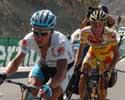
|
The day Vinokourov refers to was stage 17, the penultimate day in the mountains. Twenty four hours previously he had tried and failed to distance his big rival on the road to the top of Calar Alto, but it was a different matter the following day. Although the course profile suggested that little change in the general classification was possible, he attacked very strongly on the final climb, the first category ascent of Monachil, and then went again on the descent when Valverde finally managed to bridge across.
From there to the finish he joined forces with Tom Danielson (Discovery Channel) and managed to eke out a considerable lead of 1'39 over the deeply disappointed Spaniard, who had forgotten to zip up his jersey on the descent. That was enough for the jersey to change hands, and while a margin of just nine seconds separated them that evening, Vino went on the offensive again on the road to the Sierra de la Pandera and scooped another 32 seconds.
"I think the day to Granada was very important, as I got back most of the time that I had lost on the first mountain stage," he stated, when asked what was the key moment of the race. "Perhaps Alejandro missed out on having a rider ahead who could help him."
The net result of those two days in the mountains was that the race looked to be his. Vinokourov's pedigree in the time trial showed that the final test was almost destined to go his way and so it proved, the Kazakhstani taking his third stage win on his 33rd birthday. It meant that Valverde would start the final stage 1'12 behind; with the last day traditionally a processional one the game was, to all extents and purposes, over.
"This is a good birthday present," Vino said after the race against the clock. "I was very motivated this morning to win the stage for my birthday, it is good present for me."
Bouncing back from Tour disappointment
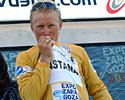
|
As he said more than once at the Vuelta, winning the race made up for the disappointment he felt at the team's non-participation in the Tour de France. The implication of several riders in the Operación Puerto affair meant that they had too few riders to start the event; he had spent months preparing for the event and given that he himself was not connected to the investigations, Vinokourov found it a tough thing to take.
"Missing the Tour was a big disappointment for me and my team because two of the riders, Paulinho and Contador, were cleared afterwards. That is not very just for us," he stated. "However we found our morale and concentrated on continuing the season."
At the press conference after stage 20, he was asked how he managed to rebuild his morale at that difficult time.
"The first ten or so days after the start of the Tour were very difficult," he answered. "When you spend time away from your family, working hard and doing training camps in the mountains, it is hard not to be able to take part in your big goal. But I went back home [after the start of the Tour] and had time with my family, spending a very nice time with them. That helped and my morale started to come back then.
"This victory is a bit of revenge and it shows I can ride at a very high level in a Grand Tour. It is important for me, but also for our sponsor, the sport at home and the country of Kazakhstan. It makes this a good season. The Vuelta is a good motivation to go to the Tour 2007 with more motivation to win."
Given that those two riders were eventually cleared, he was asked if he considered taking legal action against the Tour organisers. "This Vuelta is a sporting revenge, as I could demonstrate directly to Christian Prudhomme (general manager of the Tour) who was at the Pandera stage finish," he stated. "I believe that I can win the Tour at 33 years of age, like Lance Armstrong. But it is difficult to think about a legal revenge due to the code of ethics which is in place. I think there is nothing that can be done."
The Astana team
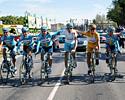
|
When team manager Manolo Saiz was arrested in connection with the Operación Puerto bust back in May, team sponsors Liberty Seguros quickly announced that they would pull out. Secondary backers Würth would remain until the team was excluded from the Tour, but before then Vinokourov set about looking for others to get involved.
He has a close relationship with the Kazakh Prime Minister Danial Akhmetov, who also happens to be the head of the national cycling federation, and a plan was quickly drawn up. Some of the country's biggest companies agreed to back a new-look team, which was to be called Astana after Kazakhstan's capital.
"It was thanks to the help of the Prime Minister that we found sponsors," he told the press on Saturday. "Now, this Vuelta is a big victory for all the country and for me. There is a big celebration in Kazakhstan because this is an important triumph for us."
Given that he signed a contract with Manolo Saiz to race with him until 2008, there is a possibility that the Spaniard could cause complications if he is eventually cleared, unlikely as it seems. Vinokourov was asked if he was worried about this. "Manolo has my respect," he replied. "I believe that he is an intelligent person and knows that it was I who brought this sponsor to the team. I believe that it would be very complicated if he did not let us continue. I hope that he lets us do so, because it is very difficult to take part in the Tour with him if he is still here.
"For the remaining years of my career I will do what I can to win, and also to help the young riders to progress. After that, I hope to stay on as part of this team but I am not sure yet what that role might be."
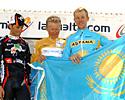
|
If he does elect to take a directeur sportif role, it would see him guiding people such as Andrey Kashechkin, the team-mate who took third in this Vuelta and won a stage. They were a powerful double act during the race and there is clearly a close bond between the two.
"I've known Kash for eight years. He is younger than me and I think that he is my natural successor. He helped me a lot in this race and I am very happy because he rode strongly here. It is his second Grand Tour and I think he has a very good future ahead."
Another rider from Kazakhstan is an influence, although he is not part of the team. "Kivi is someone I think about a lot," Vinokourov said, referring to the late Andrei Kivilev, who died in a crash in the 2003 Paris-Nice. "He is always with us."
World's and Tour
Vinokourov has won many of the biggest races in cycling and this Vuelta victory means that he has added a Grand Tour to his palmares. However there are two more big races that he is chasing. The first of these is the world road race championships, which will be held in Salzburg this coming Sunday. Back in 2000 Vino was second in the Olympic road race behind Jan Ullrich, and last year he was one of the main animators of the worlds in Madrid. Victories in races such as the Liège-Bastogne-Liège classic have marked him out as a proven winner on tough one-day courses. What does he think of his chances?
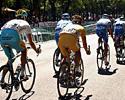
|
"Well, I have only see the course on video," he told the press. "I think it will be hard, especially after 270 kilometres. One thing I don't think is very fair is that we are only allowed have three riders from Kazakhstan. Some of the other teams will have much more. But I will race without worrying and if there is a chance for us, we will certainly take it."
Longer term, next year's Tour de France is the big goal. He has finished fifth and third there in the past and while he is older now, winning his first Grand Tour will mark him out as one of the big favourites.
"I am 33 years old but I am rider with a dream of winning the Tour. I will do all that I can to do so next year. That would complete my dream, as it has always been one of my big goals. I will prepare 100 percent for it.
"I tend to do well every second year in the Tour. In 2002 I didn't do the Tour, nor in 2004 or 2006. But I think 2007 will be a good year for me."
When asked as to who his principal rivals will be, he names the younger generation. "I believe that Valverde will be one, because is young and has demonstrated here that is very strong over three weeks. Cunego too and maybe Basso, if he overcomes his problems."
Vinokourov will have strong allies, though. Kashechkin has proved at this Vuelta that he is someone who will be in the thick of the fight, and another strong right hand man will be former T-Mobile team-mate Andreas Klöden. "He is going to race with us," says Vinokourov. "He is happy to work 100 percent for me for the Tour. That is his choice and I am happy with that."
It should make for a gripping event. Last year's Tour saw many trademark attacks by Vino in the mountains, sending the pace sky high and setting the adrenaline coursing through the veins of anyone who was a fan of no holds barred, all-out racing. However as much as the sight of him surging off the front was a defining one of that Tour, so too was the dramatic implosions which often followed as he blew and slipped backwards.
That's all changed now; this year's Vuelta shows he now has the consistency to finally win the Tour de France. Sunday took him a step closer to that dream; it will be interesting to see what happens next.
